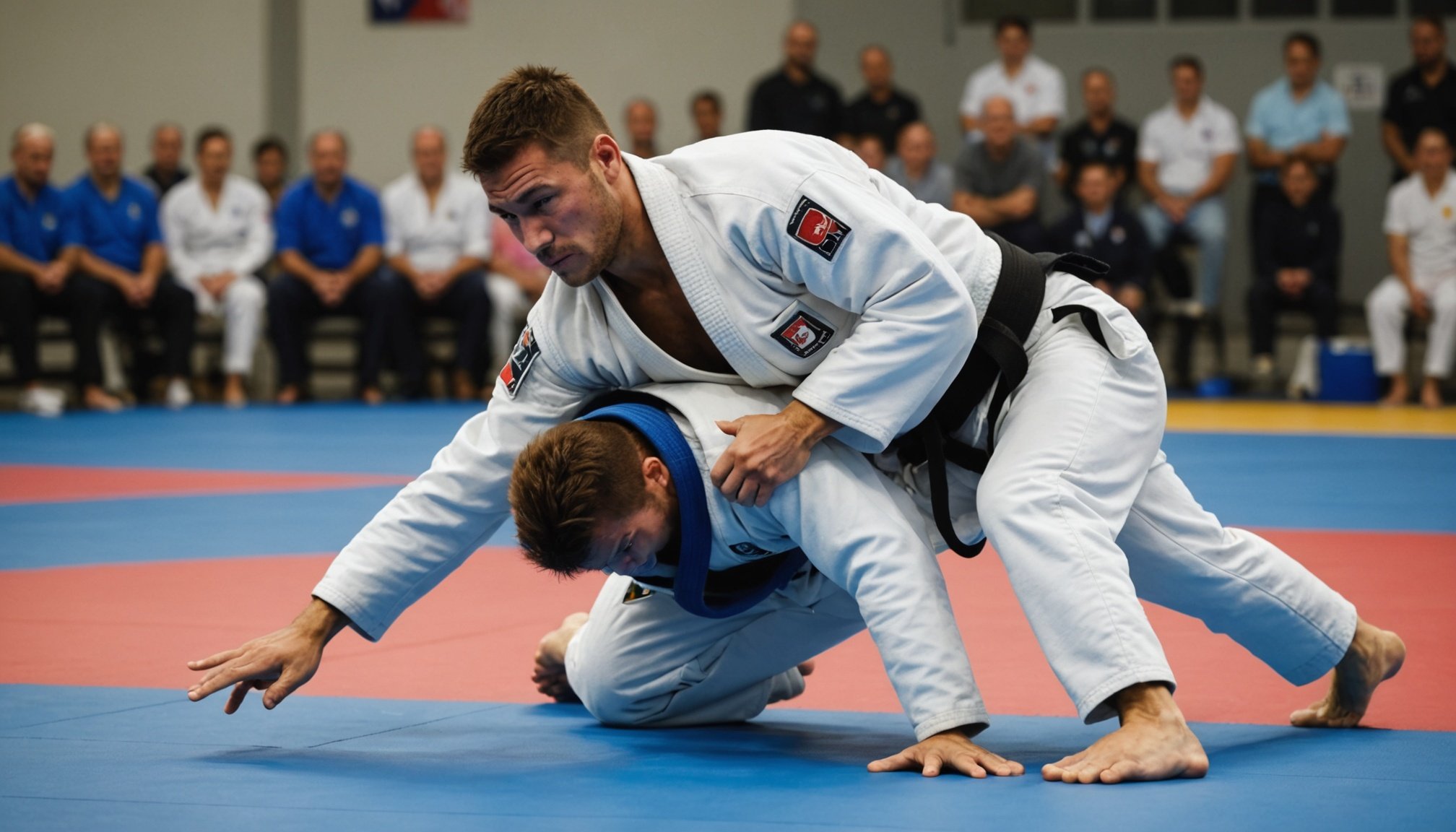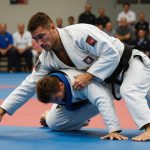Unlocking Mental Strength: Essential Psychological Strategies for Building Resilience in Professional Judo Athletes
The Mental Game in Judo: Why It Matters
When it comes to judo, or any combat sport for that matter, the mental aspect of the game is just as crucial as the physical. Elite athletes in judo understand that their mental toughness can be the deciding factor between victory and defeat. The mental game refers to the psychological factors that influence athletic performance, including confidence, focus, motivation, and resilience. These elements are not just important for success on the mat but also for navigating the challenges of life beyond the sport.
“Winning starts in the mind,” as emphasized in sport psychology. Techniques such as visualization, goal-setting, positive self-talk, mindfulness, and attentional control are essential tools that judo athletes can use to develop the mental resilience needed to perform at their best[1].
In the same genre : Top Strategies to Stay Hydrated During Outdoor Track Events: Your Ultimate Guide to Preventing Dehydration
Building Mental Toughness Through Visualization
Visualization is a powerful technique used by many elite athletes, including those in judo. This involves mentally rehearsing a specific scenario or performance, imagining oneself executing techniques flawlessly and overcoming challenges. Here’s how visualization can be applied:
- Pre-Competition Preparation: Before a match, athletes can visualize themselves performing well, winning, and handling different scenarios. This helps build confidence and reduces stress.
- Skill Development: Visualization can be used to practice and perfect techniques without the physical strain. Athletes can visualize different moves, transitions, and strategies, which can enhance their muscle memory and decision-making during actual matches.
- Overcoming Setbacks: After a loss or a setback, visualization can help athletes rebuild their confidence by imagining themselves overcoming similar challenges in the future.
For example, a judoka preparing for a major tournament might spend 10-15 minutes each day visualizing their matches, including the feeling of winning and the strategies they will use to outmaneuver their opponents.
Also read : Top Strategies for Evaluating Performance Gains in Competitive Rowing
The Role of Goal-Setting in Mental Training
Goal-setting is another critical component of mental training for judo athletes. Setting specific, measurable, achievable, relevant, and time-bound (SMART) goals helps athletes stay focused and motivated.
Types of Goals
- Short-Term Goals: These could include improving a specific technique, increasing endurance, or winning a local tournament.
- Example: “I will master the ippon seoi nage by the end of the month.”
- Long-Term Goals: These are broader and more ambitious, such as qualifying for the Olympics or becoming a world champion.
- Example: “I will qualify for the Olympic team within the next two years.”
How to Set Effective Goals
- Make Goals Specific: Clearly define what you want to achieve.
- Make Goals Measurable: Quantify your goals so you can track progress.
- Make Goals Achievable: Ensure your goals are realistic based on your current level and resources.
- Make Goals Relevant: Align your goals with your values and long-term vision.
- Make Goals Time-Bound: Set deadlines for achieving your goals.
By setting clear and achievable goals, judo athletes can maintain a high level of motivation and focus, which is essential for peak performance.
Positive Self-Talk and Its Impact on Mental Health
Positive self-talk is a technique that involves using positive, encouraging language to build confidence and stay motivated. This is particularly important in high-pressure sports like judo, where athletes often face intense physical and mental stress.
Benefits of Positive Self-Talk
- Boosts Confidence: Positive affirmations can help athletes believe in their abilities and perform better under pressure.
- Reduces Stress: Encouraging self-talk can calm nerves and reduce anxiety.
- Improves Resilience: It helps athletes bounce back from setbacks and maintain a positive mindset.
How to Practice Positive Self-Talk
- Daily Affirmations: Start each day with positive affirmations, such as “I am capable and strong,” or “I will perform my best today.”
- During Training: Use positive self-talk during training sessions to stay motivated and focused.
- After Setbacks: After a loss or a difficult training session, use positive self-talk to rebuild confidence and maintain a positive outlook.
For instance, a judoka might say to themselves, “I have trained hard and I am ready for this match,” before stepping onto the mat.
Mindfulness and Attentional Control in Judo
Mindfulness and attentional control are techniques that help athletes stay calm and focused in high-pressure situations. Mindfulness involves practices like deep breathing, meditation, and body scans to reduce stress and improve concentration.
Mindfulness Techniques
- Deep Breathing: Take slow, deep breaths to calm the mind and body.
- Meditation: Practice mindfulness meditation to improve focus and reduce stress.
- Body Scans: Perform body scans to relax and focus on the present moment.
Attentional Control
Attentional control involves focusing on specific aspects of the game to maintain concentration. Here are some strategies:
- Cue Words: Use specific words or phrases to refocus attention during matches.
- Example: “Stay calm, stay focused.”
- Focus on the Process: Instead of worrying about the outcome, focus on the process of executing techniques correctly.
For example, during a match, a judoka might use the cue word “breathe” to remind themselves to stay calm and focused.
Table: Comparing Psychological Strategies for Judo Athletes
| Strategy | Description | Benefits | Examples |
|---|---|---|---|
| Visualization | Mentally rehearsing scenarios or performances | Builds confidence, reduces stress, enhances skill development | Visualizing winning a match, perfecting techniques |
| Goal-Setting | Setting SMART goals | Maintains focus and motivation, tracks progress | Short-term: Mastering a technique; Long-term: Qualifying for the Olympics |
| Positive Self-Talk | Using positive affirmations | Boosts confidence, reduces stress, improves resilience | Daily affirmations, during training, after setbacks |
| Mindfulness | Practices like deep breathing, meditation, body scans | Reduces stress, improves concentration | Deep breathing before a match, meditation to relax |
| Attentional Control | Focusing on specific aspects of the game | Maintains focus and concentration | Using cue words, focusing on the process |
Better Coping Skills and Mental Health
Sports, especially combat sports like judo, can be challenging and stressful. Athletes may face injuries, setbacks, and other difficulties that can impact their mental health. Sport psychology can help athletes develop better coping skills to manage these challenges.
Managing Stress
- Recognize Stress: Identify the sources of stress and acknowledge its impact.
- Use Relaxation Techniques: Employ techniques like deep breathing, meditation, or yoga to reduce stress.
- Seek Support: Talk to coaches, teammates, or mental health professionals for support.
Bouncing Back from Setbacks
- Learn from Mistakes: Analyze setbacks to learn and improve.
- Stay Positive: Use positive self-talk to maintain a positive mindset.
- Focus on the Present: Concentrate on what can be controlled in the present moment rather than dwelling on past setbacks.
For example, after an injury, a judoka might focus on rehabilitation and use positive self-talk to stay motivated and confident about their return to competition.
Practical Insights and Actionable Advice
Here are some practical tips for judo athletes looking to enhance their mental strength:
Create a Mental Training Plan
- Incorporate visualization, goal-setting, positive self-talk, mindfulness, and attentional control into your daily routine.
- Set aside specific times for mental training, just as you would for physical training.
Seek Professional Help
- Work with a sport psychologist to develop personalized mental training strategies.
- Use resources like mental performance coaching programs to gain additional support.
Integrate Mental Training into Physical Training
- Use visualization and positive self-talk during physical training sessions to enhance focus and motivation.
- Practice mindfulness and attentional control during sparring or drills to improve performance under pressure.
Building mental strength is a crucial aspect of becoming a successful judo athlete. By leveraging techniques such as visualization, goal-setting, positive self-talk, mindfulness, and attentional control, athletes can develop the resilience and mental toughness needed to perform at their best. These strategies not only enhance athletic performance but also contribute to better mental health and coping skills, benefiting athletes both on and off the mat.
As Colby’s Peak Performance program emphasizes, mental performance coaching is essential for athletes to achieve their full potential and navigate the challenges of sports and life beyond the game[4].
In the words of many elite athletes, “The mind is the most powerful tool you have. Train it well, and you will see the difference in your performance and your life.” By investing in mental training, judo athletes can unlock their full potential and achieve peak performance in all aspects of their lives.






